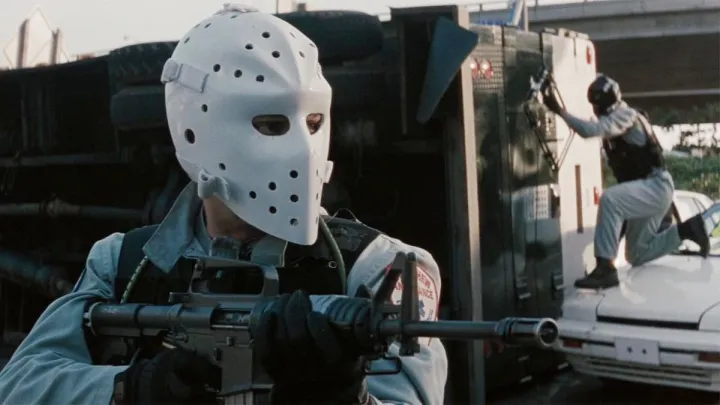There’s a reason why Netflix has a reputation as being the best streaming service out there. It consistently streams some of the best TV shows around, with this year alone bringing such wonderful and diverse programs as Beef, The Night Agent, The Diplomat, and Queen Charlotte. It’s movies, however, are more hit-or-miss. For every Oscar-nominated The Power of the Dog, there are a half-dozen Extractions or Red Notices, bland, forgettable movies that don’t have any lasting effect on the viewer beyond their initial debut.
That probably explains why Heat, a movie made nearly 30 years ago, is one of the most popular movies on Netflix right now, ranking in the top 10 for the last two weeks. The Al Pacino/Robert De Niro action drama, which was praised when it was first released in December 1995, has stood the test of time not only due to its stellar acting, pitch-perfect direction, beautiful cinematography, and moody score, but also because it’s simply one of the best movies ever made. That’s a lofty claim to make, sure, but it’s one that is justified. If you’ve already watched Heat, or have not ever heard of it and are curious to watch the Michael Mann film, here are a few reasons why it’s worth a stream.
Heat has a great story that is both simple and sprawling

Heat‘s plot can be boiled down to this: it’s a cops and robbers movie, but told in detail, with attention paid to character development, tension, and realism. Neil McCauley, played by Robert De Niro in one of his last truly great roles as a leading man, is a career thief based in Los Angeles. After a botched robbery that leaves multiple bank guards dead, McCauley and his crew decide to pull off one last score: robbing $12.2 million from a bank in downtown L.A. Hot on their tail is Vincent Hanna (Al Pacino, in peak Pacino form), a former Marine and LAPD cop who methodically pieces together McCauley’s plan and tries to stop him.
That’s Heat‘s story in a nutshell, but the genius of the movie is how it also contains a multitude of side stories that are delicately interwoven within the movie’s overall robbery plotline. There’s Neil’s tender flirtation with Eady, a lonely graphic designer he meets at a bookstore; Vincent’s crumbling marriage to Justine, who is angry for being passed over for Vincent’s obsession with his job; Vincent’s stepdaughter Lauren, who is quietly sinking under a wave of teenage depression; and Chris, Neil’s closest partner who has a tempestuous marriage to Charlene.
There’s a lot going on; for instance, I didn’t even mention the serial killer subplot! But Heat never feels overstuffed, nor do any of its stories feel underdeveloped. Everyone in the large cast is given a chance to shine, yet Mann always keeps the focus on the driving force of the narrative: the final heist, and the key players who are involved in pulling it off or stopping it from happening.
Heat’s cast includes some of Hollywood’s finest actors

It’s not too much of a stretch to claim that everyone in Hollywood was cast in Heat, but it sure seems like it. In addition to Pacino and De Niro, Heat also starred Val Kilmer as bank robber Chris Shiherlis. Kilmer was at the height of his fame in 1995, having just starred as the Dark Knight in Batman Forever and was just cast in the 1997 action pic The Saint. As Kilmer’s wife, Ashley Judd was beginning her ascent into Hollywood stardom, having earned critical raves in Smoke the same year and lining up her next movie, the John Grisham adaptation A Time to Kill. As Vincent’s stepdaughter Lauren, Natalie Portman had already made an impression in 1993’s The Professional, and would later go on to make Beautiful Girls and Mars Attacks! in 1996 and, of course, The Phantom Menace in 1999.
The rest of the cast includes (deep breath) Jon Voight, Tom Sizemore, Amy Brenneman, Wes Studi, The Simpsons‘ Hank Azaria, Tom Noonan, Mykelti Williamson, Diane Venora, Dennis Haysbert, Danny Trejo, William Fichtner, Henry Rollins, Jeremy Piven, Bud Cort, and many, many more. Heat employed a who’s who of established stars from the ’60s, ’70s, and ’80s, newcomers who would dominate the rest of the ’90s and 2000s, and character actors who are still working to this day (Fichtner was just in Hypnotic with Ben Affleck), and the result was one of the most talented movie casts of the 1990s.
Heat’s director is one of the greatest filmmakers working today

If you’re a film fan, you know who Michael Mann is. But if you’re not, you’ve probably seen some of his work on the big screen or on TV. His feature film debut was 1981’s Thief, a little-known thriller starring James Caan that shares some plot and stylistic similarities with Heat. Later, he made Manhunter, which was the first movie to put Hannibal Lecter on the big screen. His biggest claim to fame in the 1980s, however, was writing and producing Miami Vice, a massively popular TV show starring Don Johnson that Mann later adapted into a 2006 feature film with Colin Farrell and Jamie Foxx that’s also worth checking out.
Other notable works from Mann include the Daniel Day-Lewis outdoors action epic The Last of The Mohicans, the gripping real-life drama The Insider with Pacino and Russell Crowe, the biopic Ali with Will Smith, the assassin thriller Collateral with Tom Cruise, the gangster picture Public Enemies with Johnny Depp and The Pale Blue Eye‘s Christian Bale, and Blackhat with Chris Hemsworth. Not all of these movies are winners, but they are all clearly from the same director, one who is clearly drawn to stories of complicated men involved with the system of law and order.

Heat is Mann at his peak and purest form. It showcases Mann’s flair for saturated visuals (he loves a deep blue color to punctuate a shot) and for characters who don’t fit into one mold. Even though he’s one of the good guys, Pacino’s Hanna isn’t particularly likable. He ignores his wife, is loud, and flirts with breaking the law himself to get what he wants.
On the other hand, the audience understands De Niro’s McCauley more and can sympathize with his actions. He may be on the wrong side of the law (and yes, he does kill people who are just doing their jobs), but up until the finale, McCauley is more of an audience favorite than Hanna is. It’s this ambiguity of right and wrong, and the moral greys in which his characters occupy, that make Mann one of the best directors working today and what makes Heat stand out from other movies.
A score that evokes both mystery and dread
An overlooked aspect of Heat is the film’s score, which not only complements the on-screen action, but deepens it, giving it another emotional dimension. Composer Elliot Goldenthal, who would later win an Oscar for his work on the Julie Taymor-directed biopic Frida, creates a moody soundscape that fits perfectly with Heat‘s isolated, dreamy, and dangerous Los Angeles location. It’s effective in the quieter moments, particularly when both Pacino’s and De Niro’s characters are trying to connect with their loved ones and failing miserably. In the action scenes, the music is appropriately amped up, but it’s never intrusive, allowing the sound design, particularly the realistic gunshots heard in the movie’s bravura bank heist sequence, to take center stage.
The film also expertly samples the then-unknown techno artist Moby’s music, with one of his most famous songs, God Moving Over the Face of the Waters, being used in the last minutes of the movie and carried through over the end credits. I can’t really discuss why this song works so well without spoiling the ending, but I can say that the song is the perfect summation of everything that has gone on before. It’s beautiful, sad, and tragic, and it’s the only logical musical choice for the inevitable showdown between Pacino and De Niro.
Why Heat has stood the test of time
What, the excellent cast, plot, and director aren’t enough? What about how Heat marks the first time Pacino and De Niro shared a scene together? Yes, it’s the famous “diner scene” that you may have heard about, when the two enemies essentially pause their conflict and have a heart-to-heart about how they both have more in common than they care to admit. Or the excellent female supporting cast, all of whom form the heart of the movie?

Last but not least, you should watch Heat because it’s an action movie that does action right. It makes us care about the characters involved and doesn’t sensationalize gunplay or violence. The climactic bank heist is a case study in how the director utilizes sound to build tension and how that tension accentuates the action showcased in the scene. The result is one of the most thrilling and unnerving action sequences ever, and one that Heat is rightly remembered for to this day.
Heat is now streaming on Netflix.



